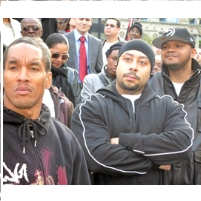Many Crimes Unsolved because of False Confessions
Thursday, January 19, 2012
 Kharey Wise, Raymond Santana and Kevin Richardson were flasely convicted in the Central Park jogger case (photo: indymedia.org)
Kharey Wise, Raymond Santana and Kevin Richardson were flasely convicted in the Central Park jogger case (photo: indymedia.org)
When police pressure innocent people into confessing to crimes they did not commit, it means those who are guilty avoid punishment, sometimes for years or even decades.
The nonprofit Innocence Project found that of 80 convicted murderers who were exonerated because of DNA evidence, about 54% had confessed to killings they didn't commit.
For instance, the famous 1989 Central Park jogger case in New York City involved five teenagers convicted of raping and severely beating a woman, Trish Meili. Four of the "guilty" confessed to the crime, and all five wound up spending years in prison. It wasn't until 2002 that the real culprit, Matias Reyes, a convicted murder and rapist, was identified and brought to justice as the sole perpetrator of the crime.
Six years ago in Tennessee, a 12-year-old boy confessed to killing his little sister after police interrogated him for hours. Thomas Cogdell, now 18, insists he didn't do it and was coerced into claiming guilt for the crime. If true, it means the real killer of Kaylee Cogdell has not been found.
The Innocence Project attributes false confessions to a variety of causes, including mental limitations, use of force or intimidation by law enforcement officers during interrogations, and fears on the part of suspects that if they do not confess, they will be convicted anyway and receive harsher sentences.
Because of cases like that of Thomas Cogdell and others, many states now require police to videotape interrogations. Currently, 18 of them mandate such recordings, at least in murder cases.
-Noel Brinkerhoff
12-Year-Old's Homicide Confession Is Case for Debate on Recorded Interrogations (by Beth Warren, Memphis Commercial Appeal)
False Confessions & Recording of Custodial Interrogations (Innocence Project)
Law and Disorder: The Psychology of False Confessions (by Wray Herbert, Huffington Post)
- Top Stories
- Unusual News
- Where is the Money Going?
- Controversies
- U.S. and the World
- Appointments and Resignations
- Latest News
- Trump Orders ICE and Border Patrol to Kill More Protestors
- Trump Renames National Football League National Trump League
- Trump to Stop Deportations If…
- Trump Denounces World Series
- What If China Invaded the United States?






Comments